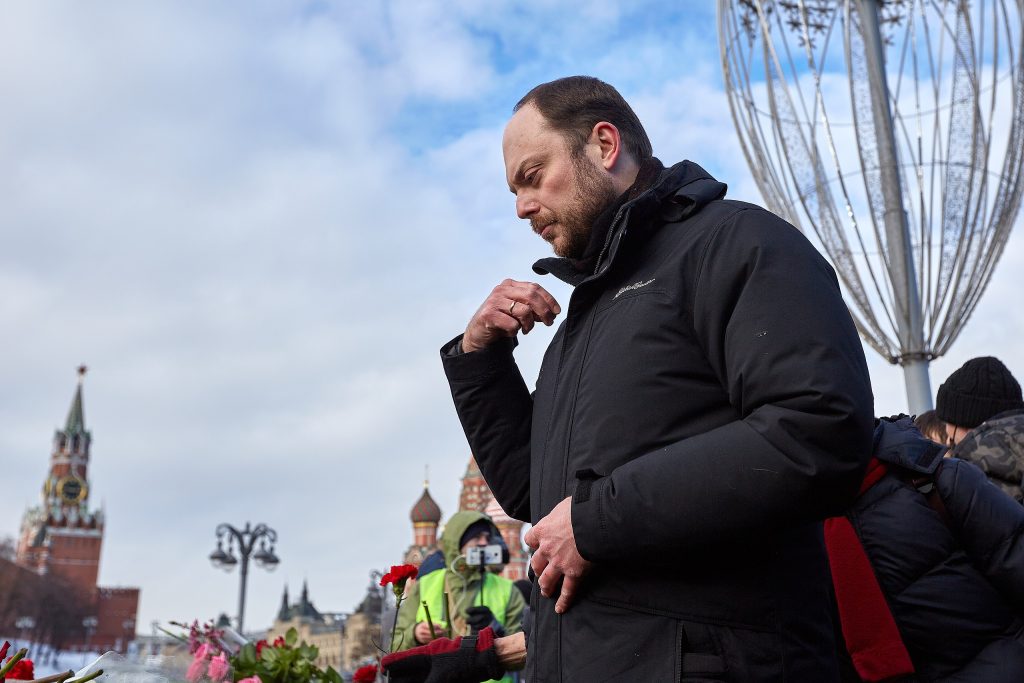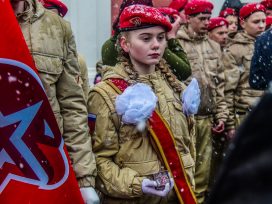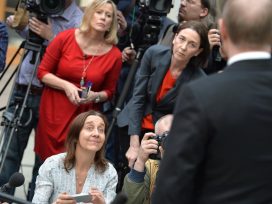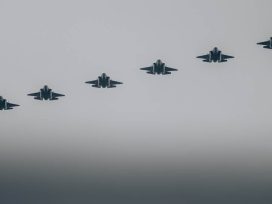In April 2023 the Russian opposition politician and human rights activist Vladimir Kara-Murza was sentenced to 25 years in prison for speaking out against the war on Ukraine. He was found guilty of ‘running an ‘undesirable organization’, of ‘spreading falsehoods about the Russian army’ and of high treason – likely in connection with his contribution to the Magnitsky Act, passed by US Congress in 2012. Kara-Murza was a close affiliate of the murdered opposition politician Boris Nemtsov and was himself twice the target of poison attacks in 2015 and 2017.
Just before his sentencing, journalists Anastasia Shteinert and Alex Strelnikov sent questions to Kara-Murza through the Russian prison postal system. In May, they received a handwritten response, in which Kara-Murza reflected on the future of Russia, his unprecedentedly severe sentence, and the war in Ukraine. Eurozine has prepared an English translation of the letter. Cuts made in the text for the sake of clarity are marked with ‘…’
What currently supports you and gives you hope for the future?
Historical education has been incredibly helpful – perhaps it has never been as useful to me as it is in the current circumstances. After all, everything that is happening now has already occurred in our history, and has always ended. And, as a rule, it has ended abruptly. This, too, will come to an end, and much sooner than some expect today, I believe.
You have said that the greatest gift for the regime is when its opponents leave the country. How do you feel about those who have decided to leave Russia?
Each person makes their own decision and no one has the right to judge them. Therefore, I can only speak for myself. I would not consider it right to engage in Russian politics, to criticize the regime, or to call on my compatriots to do something if I were far away in safety. I firmly believe that a politician should be in their own country – politics is not a field where one can work ‘remotely’ …
There is also an important moral aspect. When being in opposition to the regime becomes dangerous, those aiming to be public politicians should take on the same risks as their fellow citizens. During the [presidential] electoral campaign of 2007–2008, Vladimir Bukovsky [the opposition candidate and former Soviet dissident, exiled to the UK in 1976 – ed.] … was asked at one of the rallies, ‘Why did you return to Russia? Do you really hope to change anything?’ I will never forget his response: ‘I returned because they are starting to be afraid again. And when they start to be afraid, you need to come, stand beside them, and say, “Here I am. I am not afraid.”’
For me, this is an important motivation. It is one of the reasons I didn’t leave Russia after the two poisonings in 2015 and 2017, or after 24 February 2022.

Vladimir Kara-Murza makes the sign of the cross at the place of Boris Nemtsov’s death in Moscow, Moscow 2021. Photo: Michał Siergiejevicz. Source: Wikipedia Commons
‘The night is darkest just before dawn’ – you were one of the first to re-popularize this aphorism in Putin’s Russia. When will the dawn come and what will it look like?
[The phrase] was one of the favourites among Soviet dissidents. Some laughed at them, considering them naive romantics. Especially, perhaps, in the early 1980s, when it seemed things couldn’t get any darker: the Afghan war, the downed Boeing [the Korean passenger aircraft shot down over Russian airspace in 1983 – ed.], Sakharov in exile, a new wave of political arrests, a monstrous confrontation with the West. Who would have thought that dawn was just around the corner? The current period, by many indications, reminds me … of the early 1980s and early 1950s – that very ‘dark night before dawn’. And I believe that [dawn] is much closer today than it may seem.
As for predicting political changes, their timelines and scenarios – in our country, it is inherently futile. In Russia, major upheavals always come unexpectedly. Both the Tsarist Empire in March 1917 and the Soviet regime in August 1991 literally collapsed in three days – and no one predicted it. It will be the same next time. Our task, the task of a responsible opposition, is to prepare for these changes now, so as not to be caught off guard and to repeat the mistakes of the [republican] Provisional Government and the democrats of the 1990s.
Do you have an answer as to why Russia repeatedly returns to monarchical rule? Boris Akunin believes that the Horde system of power is at the core of this.
In our country, two cultural and historical traditions have always been in conflict: the Horde tradition and the European tradition. The latter is just as essential and integral to Russian identity, regardless of what the Kremlin propagandists may try to deny. Let’s not forget that Novgorod and Pskov were Hanseatic cities – that is also a Russian tradition. Since the Enlightenment in the 18th century, Russia has been fully integrated into the European cultural and political space. I therefore disagree that we are doomed to constantly revert to a ‘monarchic’ matrix. Russia has much to be proud of in terms of democratic traditions.
For example, in 1906, the State Duma of the Russian Empire became one of the first parliaments in Europe to pass a law abolishing the death penalty. Universal suffrage was introduced in Russia earlier than in Great Britain, France or the United States. In August 1991, our people took to the barricades, ready to sacrifice their lives … and they achieved a decade of freedom. Russia has no historical or cultural predetermination for a ‘strong hand’ – it is those who seek to justify this ‘hand’ or their own inaction who speak of it.
Many countries that are today developed liberal democracies were once considered ‘naturally totalitarian’ (such as Germany, Spain or Italy). I have no doubt that a democratic system of governance will be established in Russia in the foreseeable future.
Without imperial ambitions and a monarchical core, would Russia disintegrate?
A rigid centralized system in a country as large, multicultural and diverse as Russia is precisely the path to disintegration. It can be temporarily held together with bayonets and blood, as the Bolshevik experience showed. The best way to preserve our country and ensure its long-term development is to found it on genuine federalism, strong local government and a parliamentary system that represents … the interests of different regions, political movements and population groups. And, of course, it should have no imperial ambitions. The primary goal of the state should be the wellbeing of its citizens, not the seizure of foreign territories.
In terms of federal structure … I believe that Canada is an example for Russia. Excluding, of course, constitutional monarchy – we passed that fork in the road in the early 20th century. Our countries have a lot in common: multi-nationalism and multi-confessionalism, territorial size, natural resources, even climate. Yet Canada consistently ranks among the top countries in the world for quality of life. With the right system of governance, we can achieve no less.
How will the war in Ukraine end, do you think?
Our country has a long history of ‘short victorious wars’ that ended quite differently from how their initiators intended and led to significant political changes. This was the case with the Crimean War, defeat in which largely determined the Great Reforms of Alexander II. It was the case with the humiliating Russo-Japanese War, which led to the first Russian constitution, parliament and freedom of the press. And it was the case with the Soviet gamble in Afghanistan, which became a key factor in the collapse of the communist regime.
The war in Ukraine will end in the same way. It is already lost for the Putin regime, if only because after a year of fighting, the Ukrainian state has withstood, defended its sovereignty, and gained enormous international solidarity. The Kremlin’s plans in February 2022 were obviously different … Deep political changes in our country are only a matter of time, and not much time.
How should we preserve historical memory so that it doesn’t turn into trauma?
The main lesson our country learned from the failure of the democratic reforms of the 1990s is that, if evil is not comprehended, condemned and punished, it will inevitably return. After the collapse of the communist regime, all the archives should have been opened. The crimes of the previous regime at the state level should have been prosecuted and the structures that committed them (primarily the KGB …) prosecuted. This should have happened not only for reasons of justice, but also to prevent the possibility of an authoritarian reprisal.
Many countries that have experienced the trauma of totalitarianism have followed this path: Germany after 1945, South Africa after Apartheid, countries in Latin America after the military dictatorships, central eastern Europe after communism. In the early 1990s, the most visionary leaders of the democratic movement in Russia, such as Galina Starovoitova and Vladimir Bukovsky, demanded such [lustration] measures. But officials … warned of a ‘witch-hunt’. ‘Well, then the witches will return to haunt us’, Bukovsky replied. And he was right.
We cannot repeat this mistake at the next historical turning point. After the fall of the current regime, all its crimes must be made public, comprehended and officially condemned. And those responsible must be held accountable. This will undoubtedly be a challenging process for our society, just as denazification was in Germany or de-communization in central eastern Europe. But we must go through it to protect our country from any such repetition in the future.
Does a society that allowed totalitarianism to emerge bear collective responsibility?
This is a complex question … I am inclined to think that each person bears responsibility for themselves and then lives with that responsibility. That is why it was important for me not to remain silent, neither in the face of this war nor crimes committed by the Putin regime. The Kremlin commits these crimes ‘on behalf of Russia’, and anyone who raises their voice against it exposes the falsehood of this identification.
[The poet] Natalya Gorbanevskaya, a participant of the ‘demonstration of the seven’ on Red Square in August 1968, once said that ‘A nation minus me is not an entire nation.’ Back then, seven people were enough to save the honour of our silent society of millions. Today, there are thousands (just look at the statistics of political detentions during anti-war protests since February 2022). And I am proud of each one of them.
Dictators often claim to be true patriots. And it is often on the wave of patriotism that wars begin. So is patriotism the problem?
The ‘patriotism’ claimed by dictators must be put in quotation marks. True patriotism is not about pounding your chest and shouting that you are better than everyone else. Rather, it is about recognizing the shortcomings of your country, speaking honestly about them and striving to fix them. That is genuine love for one’s homeland – seeking to make it better, rather than asserting oneself at the expense of others. We need to cleanse the concept of patriotism of the chauvinistic and imperialistic dirt associated with it under the current regime …
What do you envision for Russia in the future? What will define the new era?
Fortunately, there’s no need to reinvent the wheel. All of humanity’s experience shows that democracy is the most reasonable, suitable and worthy system for human life and development. Competitive elections, a free press, an independent judiciary. Regular alternation of power and prevention of its usurpation by a single individual. Parliament as a place for discussion. Strong local government and genuine federalism. I want to see Russia as a country that respects the rights and freedoms of its own citizens and that adheres to the norms of civilized behaviour; a country that becomes a full-fledged participant in the global and European community; a country that is respected rather than feared. And I believe that it will inevitably happen.
What are you currently reading, and what have you already read?
During the past year in prison, I have read or reread much of what I … never had enough time to for when I was free. Mostly historical and memoir literature. I finally had time to re-read The Gulag Archipelago. … This book is essential reading in our country today. I have also reread the memoirs of Soviet dissidents – primarily Vladimir Bukovsky’s To Build a Castle: My Life as a Dissenter, one of the most important books in my life. It’s striking how much everything remains the same down to the smallest details. But we also know the ending.
What do you dream about – for yourself?
I have two dreams: to see my family and to see a free Russia. And these dreams are directly connected to each other.
What are your thoughts about your prison sentence?
Every authoritarian regime identifies itself with the nation. Saltykov-Shchedrin [the 19th-century writer – ed.] noted that in our country, two concepts are often confused: ‘the fatherland’ and ‘Your Excellency’. In such a system of coordinates, ‘patriotism’ means personal loyalty to the regime, and any opponent becomes a ‘traitor to Russia’ by default. In Nazi Germany, ‘traitors’ were anti-fascists, and in South Africa they those fighting against apartheid. In the Soviet Union, in February 1974, one of our greatest compatriots, … Alexander Solzhenitsyn, was accused of ‘betraying the Motherland’. I consider it an honour to be in such a company. As we know, time puts everything in its place ….
As for my sentence, it is undoubtedly a high-water mark. Ever since the time of Stalin, political prisoners in our country have not been given ‘quarters’ [25 years]. As Arthur Burton wrote to Gemma in the novel The Gadfly: ‘I have done my share of the work, and this death-sentence is the proof that I have done it thoroughly.’ It is clear that these 25 years (and the two poisonings before that) are primarily for my involvement in promoting the ‘Magnitsky list’ [outside Russia] … Even the judge assigned to my case – Sergei Podoprigorov – was on the ‘list’. It’s amusing how they themselves reveal what they fear the most. So, I must have done everything right.
As for how long these ‘25 years’ will last, we shall see. In our country, reality has a tendency to differ from what is written in formal papers. For instance, Solzhenitsyn’s sentence included ‘perpetual exile’. As we know, this ‘perpetuity’ quickly came to an end.







